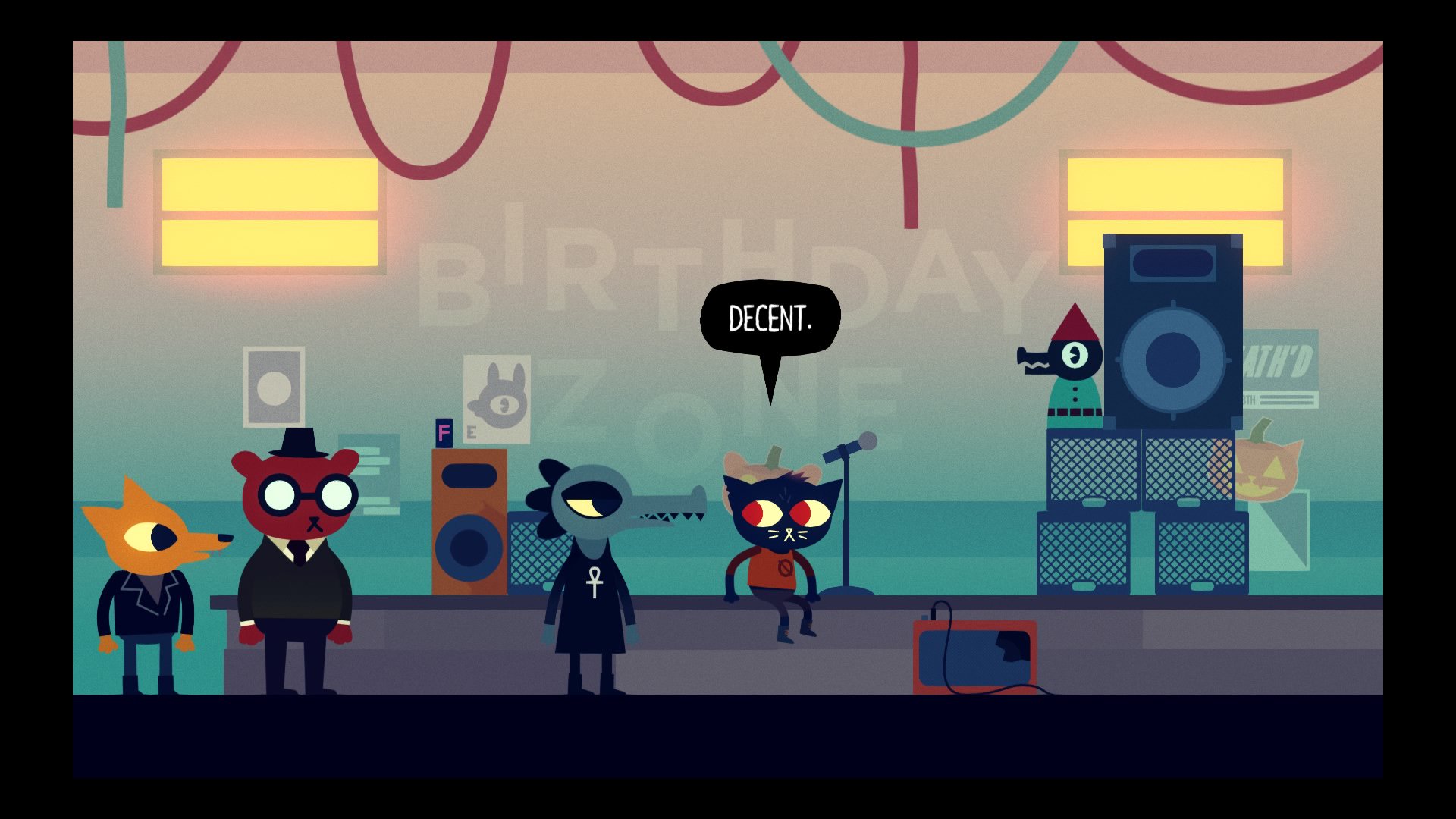You have just read a blog post written by Jason McIntosh.
If you wish, you can visit the rest of the blog, or subscribe to it via RSS. You can also find Jason on Twitter, or send him an email.
Thank you kindly for your time and attention today.

I adored almost everything about this game. I wish that, upon completion, it offered a magic button that would replay the game from the beginning by itself, taking all the major choice-paths that I didn’t, so I could see everything I missed. I’d been looking forward to playing Night in the Woods since hearing its lead designers speak at Word Play in Toronto two years ago, and for some reason their description of a particular scene of the main character and her friend eating donuts at a late-night coffee shop in their decaying rust-belt town really stuck with me. While I felt richly rewarded by every choice I made in my playthrough, I did manage to miss the donuts entirely.
For a puzzle-free game with no voice acting to slow its pace — characters speak as quickly as you can read through their word-balloons — Night in the Woods surprised me with its length. I didn’t time it, but my escorting Mae through her story took upwards of ten hours, all of which required a modicum of active attention. I certainly can’t complain about that, because I loved my playthrough. It’s a peculiarity of interactive narrative that I’ll probably just have to live — in real life! — with my choices, never really knowing how it would have shaken out had I nudged Mae into spending more time with Gregg than with Bea, say.
Years ago I wrote about how Telltale Games, starting with their Walking Dead adaptation, cracked the decades-old problem of interactive television. Night in the Woods felt like something similarly transcendent, but I can’t say what for certain. An interactive comic book, perhaps, given its echoes of Scott Pilgrim? I can’t shake the feeling that the game’s peculiar pace, the repeating days where you patrol Mae through all the stations of her old neighborhood — which become comfortable so quickly — feels almost like a favorite newspaper’s comics page. We flip to the right section and scan through all the strips, reliably in the same place day after day, seeing what our old friends have to say this time. Surely this similarity owes more to accident than intent, since Woods’s city of Possum Springs presents a far more coherent world than an eclectic funny-page does. But, such is the cozily rotating record-groove that Mae thinks, naively, that she can roll back into by returning home.
On that note, the adventures of Mae and her pals hit me where I live, even if obliquely. I don’t think I’ve played any interactive bildungsroman in which I recognized more of myself and my friends, even if removed by a generation or so.
I was nearly 27 years old when I first emerged from central Maine — whose cold little cities bear more than a passing resemblance to Possum Springs — to find my delayed independence in Boston. (I didn’t aggressively bail out of adulthood the way that Mae tried to; it just took its time in finding me.) I made many friends in short order, and one group of them happened to all be around 20, just like Mae and the gang. Through them, and to some degree alongside them, I got to experience the same sort of turbulent exit from adolescence that Night in the Woods depicts: stumblingly learning to sync yourself up with a world you didn’t make, one which will drag you along anyway if you refuse to play. You also learn that your truest friends have graduated from playmates into companions, and how vitally important they become to your ongoing sanity and survival.
The game’s sole discordant aspect — not counting my terrible performance on the bass-guitar minigames — involve its use of a certain trope in a way that doesn’t quite fit right. I recognize how the story benefits from the external and unexpected motivation, but its particular resolution in this case just felt untidy. In contrast, Woods flirts much more effectively with themes from Lovecraft — just a drop, enough to add flavor without redefining the dish. The fears that drive Mae back home seem painfully mundane on one level, but they do, in their way, mesh with existential nightmares about an uncaring cosmos that she can’t even put into words.
What I’m saying is, if you haven’t heard from me in years but you get a call from me this week, you’ll know why.
To share a response that links to this page from somewhere else on the web, paste its URL here.